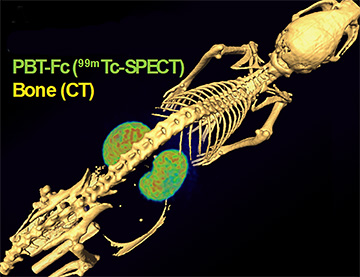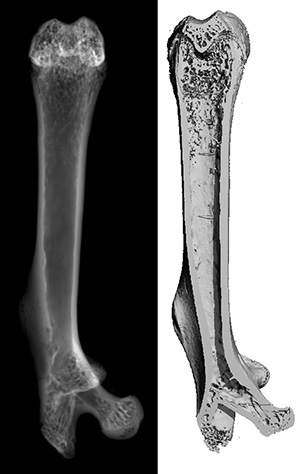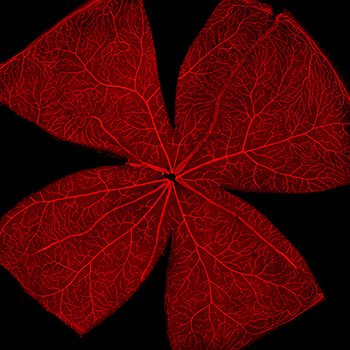Kidney Research & Therapeutics
Explore the kidney research and therapeutics programs and labs below and visit our Northwestern University George M. O'Brien Kidney Research Core Center (NU GoKidney) page to learn more.
Kidney Research & Therapeutics
Daniel Batlle, MDFocusing on the renin angiotensin system as it relates to the understanding of human diabetic kidney disease and rodent models of diabetic kidney disease and hypertension.
The Batlle Lab focuses on the renin angiotensin system as it relates to the understanding of this system in rodent kidney physiology. Of particular focus are the pathways and mechanisms that determine the enzymatic cleavage and degradation of Angiotensin II and other peptides within the system by ACE2-dependent and independent pathways. The lab uses a holistic approach involving ex vivo, in vitro and in vivo studies using various rodent models of diabetic and hypertensive kidney disease.
The lab is also involved in the search for biomarkers of kidney disease progression as part of the NIDDK Consortium on CKD. Other areas of research interest include nocturnal hypertension and the physiology and pathophysiology of electrolyte disorders such as distal renal tubular acidosis.
See the faculty profile for Daniel Batlle, MD, to learn more.
Nicolae Valentin David, PhDStudying molecular mechanisms of metabolic bone diseases, with particular emphasis on the regulation and function of FGF23 in situations of normal and abnormal mineral metabolism.
David uses a basic science and translational research approach to characterize molecular events that are involved in the expression, post-translational modifications and secretion of the bone hormone FGF23 that is highly elevated in patients with chronic kidney disease (CKD). A major area of his research focuses on investigating a novel mechanism by which inflammatory signals and iron deficiency, common consequences of CKD, regulate FGF23. Our data show that acute inflammation stimulates FGF23 production, but simultaneous increases in FGF23 cleavage maintain normal levels of biologically active protein. However, chronic inflammation and sustained iron deficiency also increase biologically active FGF23, and show that these factors may contribute to elevated FGF23 levels in CKD.
See the faculty profile for Nicolae Valentin David, PhD, to learn more.
Gal Finer, MD, PhDUnderstanding the pathophysiology of congenital anomalies of the kidney and urinary tract.
Finer has been studying functional genomics of kidney development.
See the faculty profile for Gal Finer, MD, PhD, to learn more.
Cybele Ghossein, MDStudying chronic kidney disease and continuous renal replacement therapy for critically ill patients.
See the faculty profile of Cybele Ghossein, MD, to learn more.
Jing Jin, MD, PhDSeeking to understand the molecular mechanisms of kidney and vasculature diseases.
Seeking to understand the molecular mechanisms of kidney and vasculature diseases.
 The Jin Lab is interested in understanding the molecular mechanisms of kidney and vasculature diseases. Cell junction and matrix proteins play a major role in the disease etiology and progression. We study how vascular and glomerular basement membrane (GBM) matrix proteins are interwoven, and the mechanisms for physiological and pathological GBM remodeling during repair. Specifically, we use mass spectrometry to map the patterns of post-translational modifications such as hydroxylation and glycosylation on the GBM collagen and study how these affect the meshwork topology. Ultimately we hope such knowledge may help to devise targeted therapies for a broad range of kidney and vascular diseases
The Jin Lab is interested in understanding the molecular mechanisms of kidney and vasculature diseases. Cell junction and matrix proteins play a major role in the disease etiology and progression. We study how vascular and glomerular basement membrane (GBM) matrix proteins are interwoven, and the mechanisms for physiological and pathological GBM remodeling during repair. Specifically, we use mass spectrometry to map the patterns of post-translational modifications such as hydroxylation and glycosylation on the GBM collagen and study how these affect the meshwork topology. Ultimately we hope such knowledge may help to devise targeted therapies for a broad range of kidney and vascular diseases
The lab is generally interested in the pathological mechanisms of kidney and vascular diseases. We take a proteomic approach to study molecules that serve structural or functional roles in kidney filtration. Particularly, we are trying to understand how the kidney podocytes maintain and regulate their slit diaphragm, as well as their interactions with the glomerular basement membrane.
See the faculty profile for Jing Jin, MD, PhD, to learn more.
Pinelopi Kapitsinou, MDBecause of its specialized vascular anatomy and the relatively low tissue pO2 levels, the kidney is particularly susceptible and responsive to hypoxia; we are interested in how oxygen sensing responsive pathways affect kidney disease development.
The goal of our research is to understand the molecular mechanisms that dictate tolerance to hypoxic kidney injury and to translate these findings for novel diagnostic and therapeutic approaches. Central mediators of adaptation to O2 deprivation are hypoxia-inducible transcription factors HIF-1and HIF-2, whose activity is regulated by proyl hydroxylase domain–containing enzymes (PHDs). To link the hypoxia-elicited adaptive responses to kidney injury, we have two areas of research:
- The endothelial cell (EC) metabolic reprogramming mediated by hypoxic signaling in acute kidney injury and repair. To this end we use transgenic mice and in vivo models of kidney disease, while for metabolic analysis, we profile metabolites, assess cellular bioenergetics and perform targeted metabolic interference experiments.
- HIF-induced systemic metabolic responses as mediators of resistance to kidney insults . To identify the biological pathways involved in mediating hypoxia tolerance, we perform an integrative OMICs based analysis of settings in which hypoxia is encountered. Common “hits” from these hypothesis-generating studies are the focus of mechanistic studies examining the contribution of specific metabolic pathways in hypoxia tolerance in the context of kidney injury.
Lab Members
- Pinelopi Kapitsinou, MD (PI)
- Ratnakar Tiwari, PhD (Postdoc Fellow)
- Gabriella Borkowski, BSc (Research assistant II)
Contact Us
303 E. Superior St. SQBRC8-400
Chicago, IL 60611
pinelopi.kapitsinou@northwestern.edu
Aline Martin, PhDInvestigating disorders of bone and mineral metabolism and their contribution in kidney and cardiovascular diseases.
Investigating disorders of bone and mineral metabolism and their contribution in kidney and cardiovascular diseases.
 Our lab focuses on molecular mechanisms of bone and mineral metabolism disorders. One major focus of the lab is to understand the regulation and function of the skeletal hormone fibroblast growth factor 23 (FGF23) and its role in pathologies associated with altered phosphate metabolism (hereditary hypophosphatemic rickets, chronic kidney disease,…). Using genetic and pharmacologic approaches in vivo and in vitro, recent studies from the Martin Lab have identified new molecular targets of FGF23 contributing to disease and therapeutic strategies to reduce the production of FGF23 in bone and ameliorate disease outcomes.
Our lab focuses on molecular mechanisms of bone and mineral metabolism disorders. One major focus of the lab is to understand the regulation and function of the skeletal hormone fibroblast growth factor 23 (FGF23) and its role in pathologies associated with altered phosphate metabolism (hereditary hypophosphatemic rickets, chronic kidney disease,…). Using genetic and pharmacologic approaches in vivo and in vitro, recent studies from the Martin Lab have identified new molecular targets of FGF23 contributing to disease and therapeutic strategies to reduce the production of FGF23 in bone and ameliorate disease outcomes.
See the faculty profile for Aline Martin, PhD, or visit the Martin Lab site to learn more.
Sook Hyeon Park, MDImproving outcomes of and access to kidney transplants.
Park is working to develop predictive models using artificial intelligence, statistical methods and non-invasive biomarkers to provide better decision-making tools for patients and clinicians.
See the faculty profile of Sook Hyeon Park, MD, to learn more.
Susan E. Quaggin, MDUnderstanding the role of the ocular endothelium in vision with the aim of discovering therapeutic targets to be translated into patient care.
Endothelial dysfunction is a major cause of vision loss, playing a key role in diseases including age-related macular degeneration, diabetic retinopathy and glaucoma; we focus on understanding the role of the ocular endothelium in vision with the aim of discovering therapeutic targets to be translated into patient care.
See the faculty profile for Susan Quaggin, MD, to learn more.
Benjamin Thomson, PhDUnderstanding the role of the ocular endothelium in vision.
Understanding the role of the ocular endothelium in vision.
 Endothelial dysfunction is a major cause of vision loss, playing a key role in diseases including age-related macular degeneration, diabetic retinopathy and glaucoma. We focus on understanding the role of the ocular endothelium in vision with the aim of discovering therapeutic targets to be translated into patient care.
Endothelial dysfunction is a major cause of vision loss, playing a key role in diseases including age-related macular degeneration, diabetic retinopathy and glaucoma. We focus on understanding the role of the ocular endothelium in vision with the aim of discovering therapeutic targets to be translated into patient care.
See the faculty profile for Benjamin Thomson, PhD, to learn more.
Jennifer A. Tuazon, MDConducting clinical research on polycystic kidney disease.
Jan Andrzej Wysocki, MD, PhDStudying the kidney renin-angiotensin system and the role of the angiotensin converting enzyme-2 (ACE2) in diabetic kidney disease and hypertension.
Wysocki’s work has involved studies on the design and generation of recombinant ACE2 proteins and their effects on blood pressure, and diabetic and hypertensive kidney injury models. An array of bioengineered soluble recombinant ACE2 proteins have also been investigated as potential therapeutic targets in COVID-19.
See the faculty profile of Jan Andrzej Wysocki, MD, PhD, to learn more.
Xiaomin Zhang, MD
See the faculty profile of Xiaomin Zhang, MD, to learn more.
Transplant
Mohammed Javeed I. Ansari, MBBSStudying mechanisms of allograft rejection and tolerance.
The overall goal of Ansari's research is to study mechanisms of allograft rejection and tolerance and to develop assays for immune monitoring of transplant recipients. We first described the role of Th17 immunity in mediating accelerated allograft vasculopathy and resistance to tolerance induction (JEM and PNAS papers). We have extensively studied T-cell co-stimulatory pathways, specifically, the PD-1:PD-L1 pathway in regulating immune responses (multiple JEM papers). We demonstrated, in a PNAS paper, that impaired leukocyte recruitment to the allograft induces T cell exhaustion and prevents chronic allograft rejection and vasculopathy. A relatively new area of research interest is the development of a novel multiplex bead-based assay to identify and characterize HLA-specific B cells.
See the faculty profile for Mohammed Javeed I. Ansari, MBBS, to learn more.
John J. Friedewald, MDStudying kidney donation, acute renal failure, humoral allograft rejection and more.
See the faculty profile of John J. Friedewald, MD, to learn more.
Bing Ho, MD, MPHFocusing on quality and process improvement in transplant nephrology.
See the faculty profile of Bing Ho, MD, MPH, to learn more.
Translational Metabolism & Health
Tamara Isakova, MD, MMScFocusing on patient-oriented and epidemiological research of disordered mineral metabolism in chronic kidney disease.
See the faculty profile of Tamara Isakova, MD, MMSc, to learn more.
Alexander S. Leidner, MDWorking on algorithms to better predict and treat diabetic CKD, with hopes of identifying latent features for early therapy and prevention of severe diabetic kidney disease.
See the faculty profile of Alexander S. Leidner, MD, to learn more.
Rupal C. Mehta, MDGenerating new evidence to improve diagnostics and therapeutics for cardiovascular disease in patients with chronic kidney disease.
Mehta's research program uses complementary population-based and interventional patient-oriented research studies to identify and advance potential targets for the prevention and treatment of heart failure in patients with chronic kidney disease.
See the faculty profile of Rupal C. Mehta, MD, to learn more.